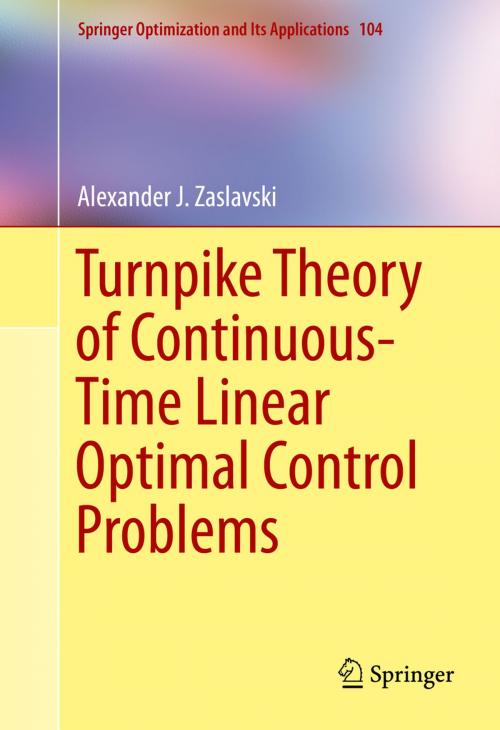Turnpike Theory of Continuous-Time Linear Optimal Control Problems
Business & Finance, Management & Leadership, Operations Research, Nonfiction, Science & Nature, Mathematics, Calculus| Author: | Alexander J. Zaslavski | ISBN: | 9783319191416 |
| Publisher: | Springer International Publishing | Publication: | July 1, 2015 |
| Imprint: | Springer | Language: | English |
| Author: | Alexander J. Zaslavski |
| ISBN: | 9783319191416 |
| Publisher: | Springer International Publishing |
| Publication: | July 1, 2015 |
| Imprint: | Springer |
| Language: | English |
Individual turnpike results are of great interest due to their numerous applications in engineering and in economic theory; in this book the study is focused on new results of turnpike phenomenon in linear optimal control problems. The book is intended for engineers as well as for mathematicians interested in the calculus of variations, optimal control and in applied functional analysis.
Two large classes of problems are studied in more depth. The first class studied in Chapter 2 consists of linear control problems with periodic nonsmooth convex integrands. Chapters 3-5 consist of linear control problems with autonomous convex smooth integrands. Chapter 6 discusses a turnpike property for dynamic zero-sum games with linear constraints. Chapter 7 examines genericity results. In Chapter 8, the description of structure of variational problems with extended-valued integrands is obtained. Chapter 9 ends the exposition with a study of turnpike phenomenon for dynamic games with extended value integrands.
Individual turnpike results are of great interest due to their numerous applications in engineering and in economic theory; in this book the study is focused on new results of turnpike phenomenon in linear optimal control problems. The book is intended for engineers as well as for mathematicians interested in the calculus of variations, optimal control and in applied functional analysis.
Two large classes of problems are studied in more depth. The first class studied in Chapter 2 consists of linear control problems with periodic nonsmooth convex integrands. Chapters 3-5 consist of linear control problems with autonomous convex smooth integrands. Chapter 6 discusses a turnpike property for dynamic zero-sum games with linear constraints. Chapter 7 examines genericity results. In Chapter 8, the description of structure of variational problems with extended-valued integrands is obtained. Chapter 9 ends the exposition with a study of turnpike phenomenon for dynamic games with extended value integrands.















